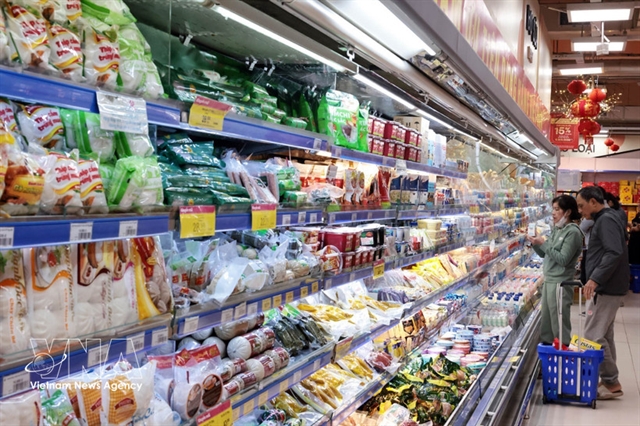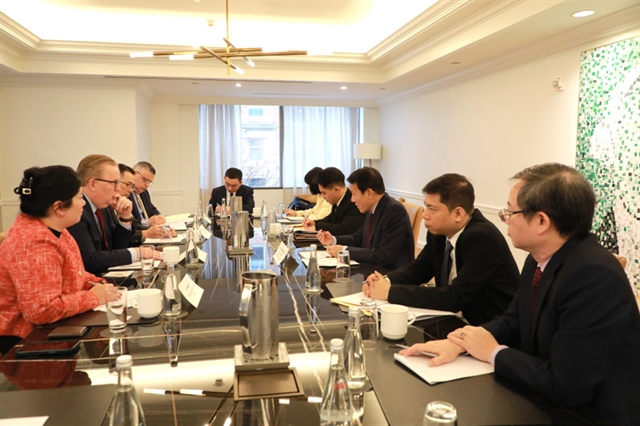 Society
Society

People in Kim Châu Hamlet, Vĩnh Trạch Commune, Bạc Liêu City are ready to celebrate Tết after a new road opened on Wednesday.

|
| The Kênh Xáng Bridge in Nguyễn Việt Khái Commune, Phú Tân District, Cà Mau Province, supported by the UNDP is inaugurated. —VNS Photo Kiều Vân |
Kiều Vân
BẠC LIÊU — People in Kim Châu Hamlet, Vĩnh Trạch Commune, Bạc Liêu City are ready to celebrate Tết after a new road opened on Wednesday.
The road is more than 2 kilometres in length and was built with help from the Japanese Government.
Lâm Thị Hải, 50, said: “The old road was very dirty. On rainy days, it was muddy and difficult to travel on. We are happy with the new road.”
The road is part of a project funded by the Government of Japan, through the United Nations Development Programme (UNDP), aiming to support poor people affected by saline intrusion and the pandemic.
Sitara Syed, UNDP Deputy Representative in Việt Nam, said: "Communities have new and better roads to facilitate travel and improve access to essential services such as schools, healthcare, trade and tourism."
“It will take a long time to fully recover from the impacts of the pandemic,” she said, “UNDP commits to support the people of Vĩnh Trạch Commune and Vietnamese farmers.”
Bạc Liêu Provincial People's Committee is calling on contributions from social organisations to build public infrastructure, including rural roads.
Due to limited resources, roads in some areas have become deteriorated.
“Bad roads are affecting local people and the transport of goods. Paved roads are necessary for residents,” said Cao Xuân Thu Vân, Deputy Chairman of Bạc Liêu Provincial People's Committee.
At the inauguration ceremony, Trương Hồng Trang, Chairwoman of the Bạc Liêu Provincial Women's Union, said 1,700 local people will benefit from the road.
By getting involved in building the road, residents also earned additional income during the COVID-19 period. Many people, especially the poor, ethnic minorities, migrant workers and those in semi-formal jobs have lost work, so their incomes and livelihoods were affected.
"The project pays people involved in the construction of the road," said Trang.
Trang said that 325 local labourers participated in the construction of the road, each receiving an average of VNĐ4.6 million for 20 working days from the project.
Lâm Thị Hải and her husband both helped in building the road. Hải said: “Before COVID-19, our income was about VNĐ70,000 per day. My husband worked as a cow breeder and I was a cook at a local kindergarten.”
“However, due to the pandemic, we have no income. Participating in building the road gives us money."
Sitara Syed said: “This income is very important for poor and near poor households to buy essential items, to pay school fees and medical expenses during the COVID-19 period.”
It was one of three rural roads UNDP helped to build in Bạc Liêu. The total costs for three roads in Bạc Liêu and 16 residential works in Cà Mau were over VNĐ3.9 billion (US$170,000).
On Thursday, Kênh Xáng Bridge in Nguyễn Việt Khái Commune, Phú Tân District, Cà Mau Province, another project supported by UNDP, was also inaugurated.
This was one of 16 public constructions in Cà Mau that UNDP sponsored to pay more than 1,400 local labourers during the COVID-19 period.
Each worker received an average income of VNĐ1.4 million.
Cà Mau Province’s breeders as well as other farmers in the Mekong Delta are being affected by the COVID-19 pandemic, witnessing a decline in revenue from agricultural and fishery breeding, of which two famous products are catfish and shrimp.
Lê Văn Sử, Deputy Chairman of Cà Mau Province, expressed his deep gratitude to UNDP for the projects.
“We are looking forward to further support from UNDP to recover after COVID-19."
Trần Thị Kiều Yến, Chairwoman of the provincial Women's Union, said: “The local budget is very limited, thanks to the support of UNDP and the Japanese Government, we are able to build bridges and roads, serving the needs of local people.” VNS




